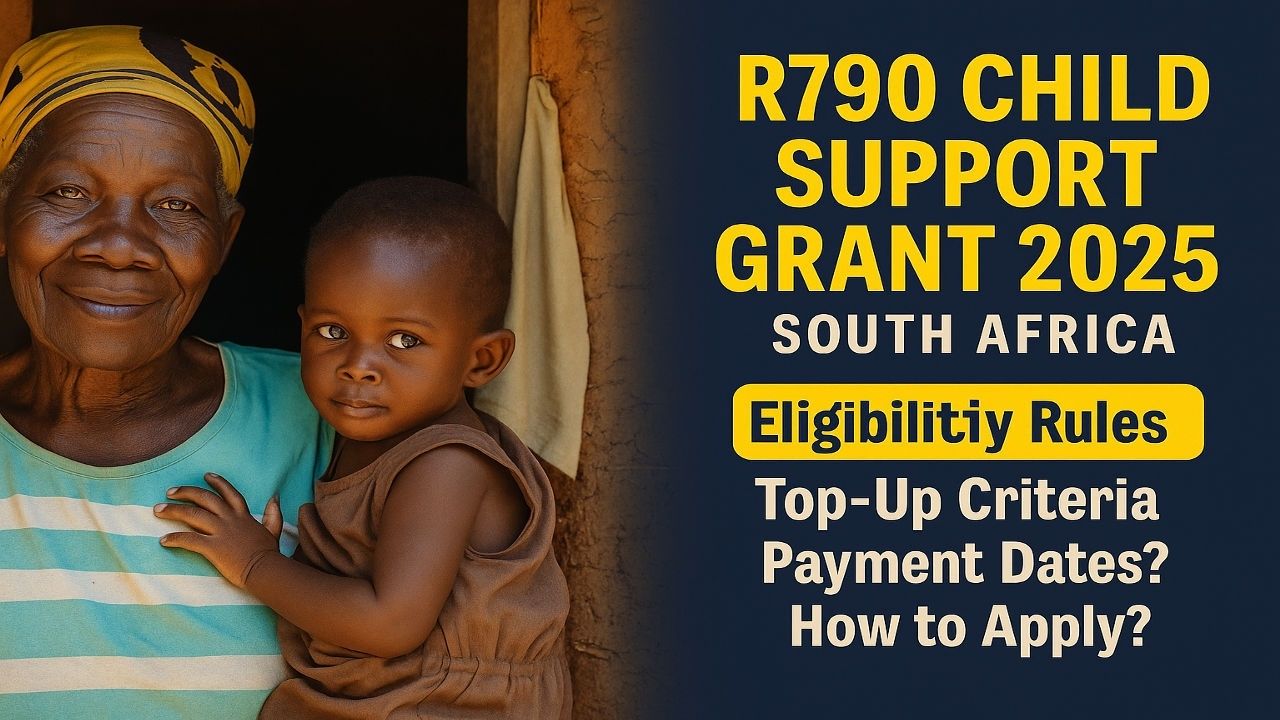The Child Support Grant is a long-standing SASSA grant designed to help cover the essentials of raising a child. The R790 figure you see widely referenced is not a new grant but the maximum that some households may receive when a qualifying top-up is added to the base R560 amount. The top-up is targeted at children in heightened vulnerability, for example certain categories of orphans or children in child-headed households. Not every beneficiary automatically receives the top-up. It is awarded after SASSA verifies that the child meets the additional vulnerability criteria and that the supporting documents are in order.
Because grant values and top-up parameters can be adjusted from time to time, always rely on your SASSA approval letter or the latest notice on the official site for the final amount credited to your child.
R790 Child Support Grant 2025 At a Glance
| Item | Details |
|---|---|
| Grant name | Child Support Grant with possible top-up for vulnerable children |
| Maximum monthly amount in 2025 | Up to R790 per eligible child, made up of a base R560 plus a qualifying top-up of R230 (in some cases a higher top-up has been used; the final value on your award letter prevails) |
| Who pays | South African Social Security Agency (SASSA) |
| Who can get it | Primary caregiver of a child under 18 who meets the means test and residency rules |
| Payment cycle | Monthly, generally in the first week; funds remain available after the release date |
| Official site | https://www.sassa.gov.za |
Who can receive the Child Support Grant
To protect resources for households that need help most, SASSA applies strict qualifying rules. In general, the caregiver must:
- Be a South African citizen, permanent resident, or recognised refugee who lives in South Africa.
- Be the primary caregiver of the child, meaning the person who is actually looking after the child every day.
- Ensure the child is under 18 and lives in South Africa.
- Pass the means test, which assesses income and assets against limits set by SASSA for single caregivers and for married caregivers. These thresholds are revised from time to time.
- Agree that only one caregiver may receive the grant for a specific child at any given time.
- Not be paid any duplicate primary grant for the same child.
Who may qualify for the top-up portion
The top-up is focused on children with limited family support or special vulnerability, for example:
- Orphans or children where one or both parents are deceased or permanently absent, with proof such as death certificates or sworn affidavits.
- Children living in child-headed households or in circumstances verified by a social worker where the household cannot meet the child’s basic needs.
SASSA makes the final determination based on documents and, where necessary, a social work assessment.
Payment dates and methods
SASSA releases child-related grants during the first week of each month. If you cannot collect on the exact day, your money does not expire; it remains in your account or available on your card.
You can receive the grant in any of the following ways:
- Direct deposit into a bank account in the caregiver’s name.
- Using a SASSA or Postbank card to purchase at participating retailers or withdraw at ATMs and till points.
- Cash-out at approved pay points or retailers in areas where that service is supported.
You may authorise a trusted person to collect on your behalf if you are ill, elderly, or unable to travel. SASSA will require written authorisation and identity documents for both parties.
Documents you will usually need
Prepare clear, up-to-date copies:
- Caregiver’s ID (smart card or green barcoded ID) or refugee documentation.
- Child’s birth certificate.
- Proof of residence such as a utility bill or official letter.
- Proof of income for the caregiver and spouse where applicable, for the means test.
- Bank account confirmation if you prefer direct deposit.
- Supporting evidence for the top-up, for example death certificates of parents, affidavits, or social worker reports.
If you lack certain documents, SASSA can accept alternative proofs such as sworn affidavits and may refer you to Home Affairs to finalise identity documents while your application is being processed.
How to apply step by step
- Choose your channel
- Visit your nearest SASSA office to complete the application with an official, or
- Use the SASSA online services portal where available to start and upload documents.
- Complete the application
Only you or a SASSA official may complete the form. You will be interviewed to confirm daily caregiving, residence, and income details. Ask the officer to note that you are applying for the Child Support Grant and, where applicable, the top-up. - Hand in documents
Provide originals and certified copies where possible. If applying for the top-up, include the relevant proofs described above. - Keep your receipt
SASSA will issue a receipt or reference number. Keep it safe. It is your proof that you applied and will help when you check status. - Wait for the outcome
Processing times can vary. SASSA may contact you for additional information, a bank-account verification, or a social worker assessment for top-up cases. - If approved
You will receive a written decision showing the grant amount and the payment method on record. Check that the amount and the number of children are correct. - If declined
SASSA must give a reason in writing. If you disagree, you may request a reconsideration or lodge an appeal within the prescribed period indicated in your outcome letter.
Keeping your grant active and on time
- Update details promptly if you change your phone number, address, bank account, or if the child’s living arrangements change.
- Respond to SASSA messages asking for verification or updated documents to avoid delays.
- If you no longer care for the child or the child leaves the country, inform SASSA. Grants can be suspended for misrepresentation, non-collection, or when eligibility conditions are no longer met.
Why the top-up matters
The cost of raising a child has risen with food, transport, school materials, and health-related expenses. For households facing unemployment or irregular income, the top-up can be the difference between meeting a child’s minimum needs and falling short. By directing the additional amount to verified vulnerable cases, SASSA strengthens the social safety net where it is most needed and helps reduce the risk of child hunger and school absenteeism.
Frequently asked questions
1) Do all Child Support Grant recipients get the full R790?
No. The base amount is R560. The top-up is awarded only when the child meets the additional vulnerability criteria and the documents are verified.
2) Can the same child be paid to two caregivers?
No. Only one caregiver can receive the grant for a specific child at any time. If caregiving arrangements change, notify SASSA to transfer the grant legally.
3) Must the caregiver be the child’s biological parent?
Not necessarily. The person who actually provides daily care can apply, provided the documents and means test are in order.
4) When exactly do payments reflect?
Child grants are released during the first week of the month. Bank processing times vary by institution. Money remains available after the release date.
5) Can I switch to a bank account later?
Yes. You can request a change from card collection to direct deposit. Submit a bank confirmation letter and ID so SASSA can update your record.
6) What if my application is declined but I think I qualify?
Use the reconsideration or appeal process described in your decision letter. Include any missing documents or clarifications that address the reason for decline.
7) Where can I check for official updates?
Always use the SASSA website and verified social media pages for current amounts, payment calendars, and application guidance.
Final note
The Child Support Grant remains a vital support for millions of children. In 2025, some families will receive up to R790 per child when they qualify for the top-up in addition to the base R560. Focus on two essentials for a smooth experience: submit complete, accurate documents and keep your personal and banking details updated with SASSA. If your circumstances change, inform SASSA promptly so your grant remains compliant and on time.
For More Information Click HERE






